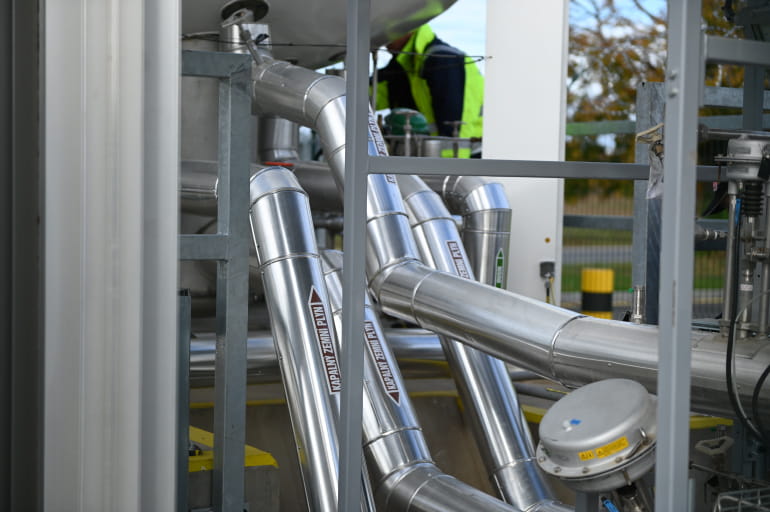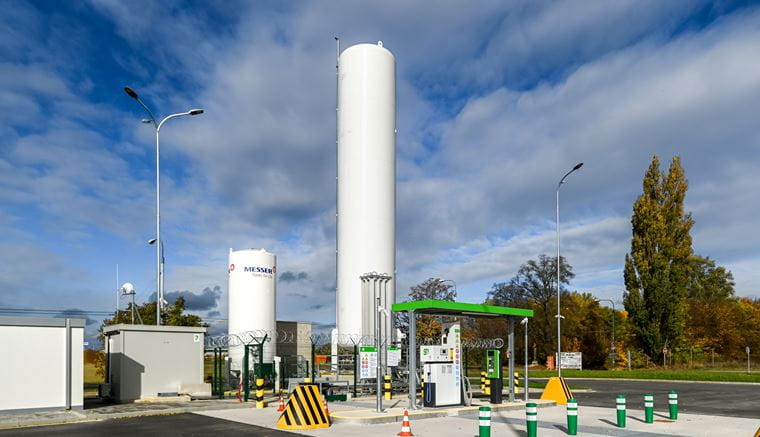GasNet opened LNG filling station in Hradec Králové
1/11/2024

The station in Hradec Králové was built as a classic brick-and-mortar fuel pump, which allows filling liquefied gas to all types of LNG vehicles currently in operation, whether they are trucks or buses. Transport operators will find the station at exit 90 of the D11 motorway - to be precise on Vlčkovická Street near the Kukleny Shopping Centre (next to the Volvo Truck Centre).
GasNet is building up its infrastructure network of LNG filling stations in critical transit routes. In addition to Hradec Králové (D11), LNG refuelling is possible in Jažlovice near Říčany (D1), Klecany near Prague (D8), Mladá Boleslav (D10), Nýřany (D5) and Kaplice (future D3).
The dispenser is self-service. The station is open non-stop. The station's capacity allows up to six trucks per hour. The refuelling itself is very simple. The main focus is on operational safety, so a protective shield and gloves are essential for refuelling. Drivers who are not yet experienced in LNG refuelling can take advantage of training from GasNet's technical specialists.
Throughout GasNet's filling station network, it is possible to pay with bank payment cards or Eurowag and DKV fuel and refuelling cards, which are also well known to diesel truck operators.
LNG and bioLNG: fast solutions for green transport
Liquefied natural gas is the only fuel currently available that can immediately reduce the emissions footprint of road freight transport.
"An LNG engine emits 70% less nitrogen oxides compared to a diesel engine. The amount of CO2 emitted is reduced by 20%. In addition, LNG combustion does not release particulate matter, which significantly improves air quality in the immediate area. Not to mention that the LNG engine is 9 dB quieter compared to a diesel," explains Filip Dostál, Head of Business Development at GasNet.
In addition, the GasNet Group is the first in the Czech Republic to sell renewable liquefied biomethane (bioLNG) at all its stations. Hradec Králové is no exception.
BioLNG has an emission footprint that is on average 95% lower than diesel. Logistics companies therefore see the purchase of LNG trucks as an opportunity to offer a sustainable, "green" service to their customers and thus meet their ESG and sustainability commitments.
"The demand for green and sustainable transport is growing. BioLNG is currently the only available fuel that can effectively respond to this demand. This is not just a matter for logistics companies, but mainly for those who order their goods from them. They are the ones who, in view of their ESG strategies and responsible business objectives, are interested in reducing their emission footprint not only in their production, but of course also in the distribution of their products. In addition to the environmental impact, the Czech Republic also has the chance to build a supply chain of Czech biomethane to Czech trucks and thus strengthen the energy self-sufficiency of the Czech economy," explains Thomas Merker, CFO of the GasNet Group.
Liquefied biomethane (bioLNG) is produced from food waste, agricultural waste or even sewage sludge. Liquefied biomethane can be obtained from virtually any biodegradable waste.

Answer to emission allowances
The Czech Republic has committed itself to meeting the EU's climate targets through the European Renewable Energy Directive. The aim is to reduce greenhouse gas emissions from transport by 14.5% or to achieve a share of renewable energy of 29% by 2030. So far, the Czech Republic and other countries have not been very successful. Europe is therefore further expanding the number of sectors burdened by emission allowances.
From 2027, they will also apply to road transport. Fuel retailers will reflect the purchase of allowances in their final prices. In practice, the extension will mean that transport companies will pay extra for every litre of fossil fuel, especially diesel. The solution is to make greater use of liquefied natural gas.
"Transport companies and their associations should take an active interest in the implementation of environmental commitments and emission allowances in transport and specific actions of the state administration, including the possibility of securing subsidies and exemptions associated with available alternative fuels. The burden of emission allowances will be lower for LNG than for diesel engines. LNG will thus bring transport and logistics companies financial benefits in the long term. Even more significant savings are offered by liquefied biomethane bioLNG," says Filip Dostál of GasNet.
For emission allowances, a starting price of €45 per tonne of CO2 is assumed. At this price, the increase in costs for a diesel engine comes out to roughly CZK 1.10 per kilometre. For bioLNG, the cost is only CZK 0.30 per kilometre, and the amount can be further reduced.
Transport operators already face emission costs when refuelling in Germany. The Federal Republic implemented the instrument of emission allowances for transport as early as 2021. The value of these allowances has increased every year and is currently €45 per tonne of CO2.
This spring, the toll rates will also be increased by a new emissions-related component. Under the current proposal, the cost of tolls for diesel trucks will rise by up to 15%. For example, Germany moved to adjust toll charges in December 2023 and the cost of tolls for diesel trucks increased by 84%.For emission allowances, a starting price of €45 per tonne of CO2 is assumed. At this price, the increase in costs for a diesel engine comes out to roughly CZK 1.10 per kilometre. For bioLNG, the cost is only CZK 0.30 per kilometre, and the amount can be further reduced.
This spring, the toll rates will also be increased by a new emissions-related component. Under the current proposal, the cost of tolls for diesel tractors will rise by up to 15%. For example, Germany moved to adjust toll charges in December 2023 and the cost of tolls for diesel tractors increased by 84%.

